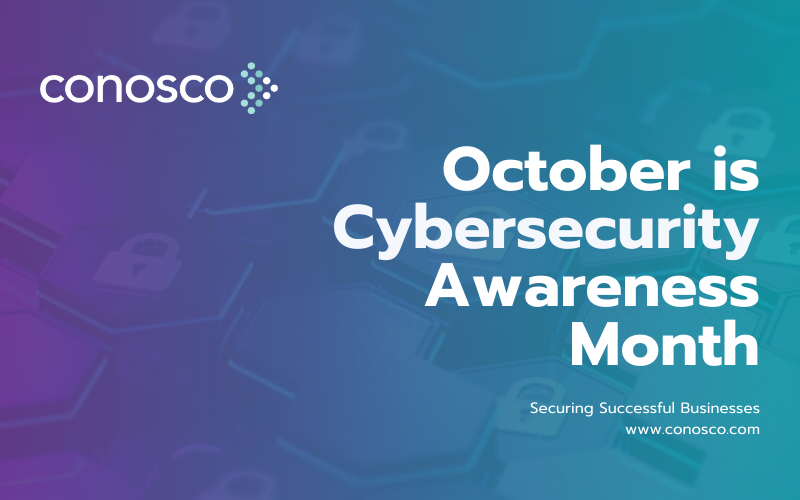Building Cyber Resilience: A Strategic Imperative for Future-Fit Businesses
by Conosco on Jan 18, 2024

.jpg?width=4043&height=2462&name=Building%20Cyber%20Resilience%20A%20Strategic%20Imperative%20for%20Future-Fit%20Businesses-%20Conosco%20(1).jpg)
The inevitability of cyber attacks necessitates a shift from defence to a proactive and comprehensive approach—cyber resilience.
This blog explores the business benefits of cyber resilience and how it can impact on the leadership roles within an organisation: the CIO, CCO, and CSO.
Cyber Resilience and the Board
With phishing and malware attacks occurring daily in the UK, security and safety is a board discussion. IT decision-makers in the UK rate cyberattacks as the third most serious challenge facing their organisations (50%), behind energy prices (61%) and the economic climate (54%).
Despite the urgency and the prevalence of cybersecurity solutions, progress is hindered by a lack of knowledge and time at the board level. Leveraging influential roles within the organisation to make a persuasive business case for cyber resilience becomes imperative.
Benefits for the board
- Business Continuity: Vigilant scrutiny of vendors and robust supply chain cybersecurity safeguards against potential threats, bolstering overall reliability. Prioritising customer readiness through education and secure platforms not only fortifies data integrity but also enhances trust. This proactive approach minimises the risk of disruptions, instils confidence among stakeholders, and ultimately strengthens business continuity.
- Increase Competitive Advantage: Cyber resilience demonstrates a commitment to safeguarding the sensitive information of customers, partners, and investors, while maintaining uninterrupted operations. Proactively addressing security concerns can attract customers, partners, and investors who prioritise working with organisations that prioritise data protection and continuity.
- Mitigate Financial Loss: Cyber resilience measures, such as robust security protocols, continuous monitoring, and response plans, help mitigate financial risks by reducing the likelihood and impact of a successful cyber attack.
- Gain Customer Trust: A company that prioritises cyber resilience demonstrates a commitment to protecting customer data, which is crucial for building and maintaining trust. By implementing security measures that safeguard customer information from unauthorised access, manipulation, or breaches, organisations reassure their clientele.
Cyber Resilience for the CIO
Amid economic and political instability, innovation becomes a key differentiator. Aligning technology capabilities with strategic vision is critical for CIOs.
Benefits to CIOs
- Achieve Top-Line Growth Targets: Cyber resilience takes a proactive and preventative approach to cyber attacks and enables swift recovery ensuring an assured supply chain and customer confidence.
- Balance Digital Development and Risk: Cyber resilience protects server-side without compromising the user experience.
Accelerate Digital Transformation: Organisations embedding cybersecurity into digital transformation efforts are six times more likely to succeed. - Online Security as a Growth Driver: Instilling a business mindset in cybersecurity minimises business impact and improves response.
Cyber Resilience for CEOs
Chief Executive Officers grapple with regulatory complexities, with GDPR and other legislation posing significant challenges.
Benefits to CEOs
- Show Due Diligence: Cyber resilience demonstrates the steps taken to protect personal data and recover swiftly in case of compromise.
- Peace of Mind with Insurance: Cyber resilience ensures compliance, making the company eligible for cyber insurance when needed.
- Mitigate Risk in a Hybrid Environment: Maintaining data protection standards across a fragmented workforce without stifling collaboration.
- Save Millions in Fallout from Non-Compliance: The average cost of non-compliance can range from $14 million to almost $40 million.
Cyber Resilience for COOs
Chief Operating Officers face the challenge of protecting every virtual nook and cranny, as cyber breaches continue to rise.
Benefits to COOs
- Protect the Online Estate 24/7: Cyber resilience ensures proactive protection and detects suspicious activity for a swift response.
- Shift Focus from Avoidance to Response: Continuous monitoring ensures being prepared for an attack and never caught off guard.
- Enhance Security Operations: Companies excelling in cyber resilience are more likely to use managed service providers for cybersecurity operations.
- Streamline a Collaborative Approach to Security: A cyber-resilient partner simplifies staying secure and eliminates the need for multiple vendors.
Cyber resilience is not just a protective measure; it's a strategic imperative for future-fit businesses. With the average cost of a data breach in the UK hitting £4.2million in 2023 and expected to rise, investing in cyber resilience becomes not only a defence mechanism but a competitive advantage and a driver of trust and growth. Want to discuss how your business can achieve cyber resilience in 2024? Get in touch with our team today.
You May Also Like
These Related Stories

How would you rate your cyber resilience?
The 15th of May marks the start of Business Continuity Week, an annual global event organised by the Business Continuity …

October Cybersecurity Awareness: Protecting your business from the inside out
Cybersecurity is a central component of every business’s strategy. From securing internal networks to managing third-par …

How to Protect Your Business From a Cyber Security Attack
Written by Hylton Stewart, Head of Security at Conosco Cyber security threats continue to rise, with trends over the las …
